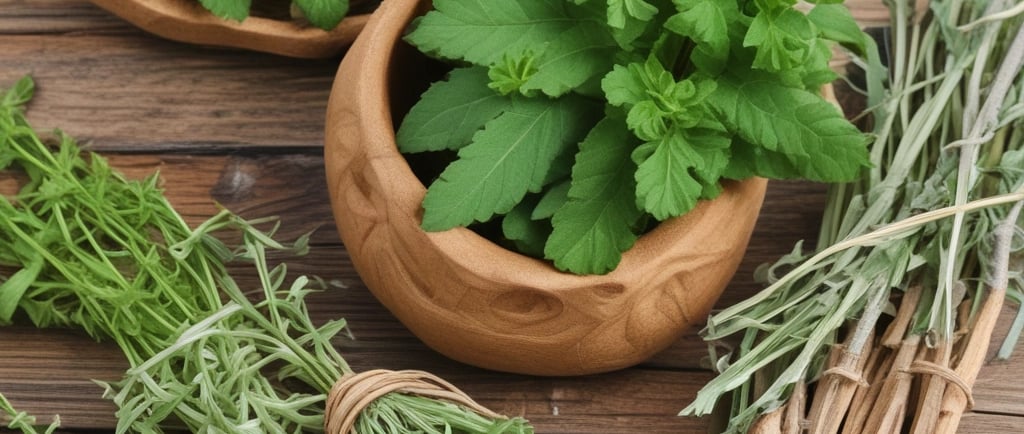Herbal Backer News & Updates: FLASH SALE!!! LIMITED TIME ONLY
Breathe Easy: Unlock the Healing Power of Nature's Top 10 Herbs for Vibrant Respiratory Health
Discover how ancient wisdom meets modern wellness in this guide to breathing freer and feeling stronger—perfect for families seeking natural support for lungs that love to thrive!
RESPIRATORY SYSTEMRECIPES
10/30/20256 min read


Discover how ancient wisdom meets modern wellness in this guide to breathing freer and feeling stronger—perfect for families seeking natural support for lungs that love to thrive!
Hello, dear reader! Imagine the crisp, invigorating scent of fresh herbs filling your home, whispering promises of clearer breaths and cozier nights. If you're new to the world of natural remedies, welcome to a gentle journey where we'll explore the magic of herbs that have soothed respiratory woes for generations. Whether you're battling seasonal sniffles, supporting little ones through coughs, or simply wanting to fortify your family's defenses, these top 10 herbs are your friendly allies. Get ready to dive in and breathe a little easier—let's uncover how nature's gifts can transform your everyday wellness!
The Top 10 Herbs for Respiratory Support: Benefits for Adults and Children
These herbs have been celebrated for their ability to ease congestion, soothe irritation, and boost lung function. Selected from trusted herbal traditions, each one offers targeted support for the respiratory system. Remember, while generally safe, always consult a healthcare professional before starting any new remedy, especially for children or if you have underlying conditions.
Turmeric: This golden spice reduces inflammation in the lungs, helps clear mucus, and fights oxidative stress from pollutants. For adults, it eases chronic respiratory issues like asthma; for children, it gently supports immune response during colds, reducing cough severity without harsh side effects.
Vasaka (Malabar Nut): A powerful bronchodilator that relaxes airway muscles for easier breathing, breaks down thick mucus, and combats infections. Adults benefit from its relief in bronchitis; kids find it helpful for productive coughs, promoting gentler expectoration.
Holy Basil (Tulsi): Acts as an expectorant to expel mucus, fights respiratory viruses with antimicrobial properties, and strengthens immunity. It calms inflamed airways in adults with allergies; for children, it reduces infection risk and soothes mild asthma symptoms.
Eucalyptus: Its decongestant compounds break up mucus and open airways, while antimicrobial effects tackle bacteria. Adults use it for sinus relief; for children over 2 (avoid internal use in infants), it eases congestion from colds in diluted forms.
Mullein: Loosens phlegm and soothes irritated lungs, making it ideal for dry coughs. Adults appreciate its role in chronic conditions like COPD; children benefit from its gentle action on whooping cough or bronchitis, reducing discomfort.
Peppermint: Menthol relaxes respiratory muscles, clears mucus, and provides antioxidant protection. It helps adults with hay fever; for kids, it's a soothing option for stuffy noses, often enjoyed in mild teas.
Licorice Root: Soothes mucous membranes, thins mucus for easier clearance, and boosts immunity. Adults find it effective for sore throats and coughs; children can use it short-term for respiratory infections, but monitor for any side effects like blood pressure changes.
Ginseng: Enhances lung function, reduces airway inflammation, and fights fatigue from respiratory issues. It's energizing for adults with chronic fatigue; for children over 12, it supports recovery from illnesses, but avoid in younger kids.
Elderberry: Antiviral properties shorten cold and flu duration, modulating immune responses. Adults use it preventatively; children love its syrup form for reducing respiratory symptom severity during viral seasons.
Osha Root: Improves lung circulation, opens airways, and expels mucus as a potent expectorant. Short-term use helps adults with acute congestion; for children, it's best in small, supervised doses for severe coughs.
Why These Herbs Deserve a Spot in Your Home Remedy Arsenal
In a world full of quick fixes, these herbs stand out as time-tested treasures that empower you to take charge of your family's health naturally. They're important because they address root causes—like inflammation, mucus buildup, and infections—rather than just masking symptoms. Adding them to your arsenal means fewer trips to the pharmacy, cost-effective support during cold seasons, and a boost to overall immunity. For families, they're versatile and often palatable, teaching kids the value of nature's pharmacy while providing gentle relief. Plus, they promote holistic wellness, reducing reliance on synthetics and fostering a deeper connection to self-care. Start small, and you'll wonder how you ever managed without them!
How to Take Each Herb: Forms and Dosing for Adults and Children
Always start with the lowest dose and observe effects. Use high-quality, organic sources. For children, apply Young's Rule: Child dose = Adult dose × (Child's age / (Child's age + 12)). Examples assume a 6-year-old (dose ≈ 1/3 adult). Consult a pediatrician, especially for kids under 2. Doses are general; adjust based on weight and needs.
Turmeric: Tea (1 tsp powder in hot water, 1-3 cups/day adult; 1/3-1 cup child). Supplement (500 mg 1-2x/day adult; adjusted child). Golden milk for palatability.
Vasaka: Tea (1 tsp leaves, 1-2 cups/day adult; 1/3-2/3 cup child). Capsule (300-500 mg 2x/day adult; adjusted). Short-term use.
Holy Basil: Tea (1 tsp leaves, 2-3 cups/day adult; 1/2-1 cup child). Tincture (1 ml 3x/day adult; adjusted).
Eucalyptus: Inhalation (few drops in steam, 2-3x/day adult/child over 2). Tea (1 tsp leaves, 1-2 cups/day adult; 1/3 cup child over 6). Avoid internal for under 6.
Mullein: Tea (1 tsp flowers/leaves, 1-3 cups/day adult; 1/3-1 cup child). Tincture (2 ml 3x/day adult; adjusted).
Peppermint: Tea (1 tsp leaves, 2-3 cups/day adult; 1/2-1 cup child). Oil (diluted rub on chest, 1-2x/day).
Licorice Root: Tea (1 tsp root, 1-2 cups/day adult; 1/3 cup child short-term). Avoid long-term due to potential side effects.
Ginseng: Tea (1 tsp root, 1 cup/day adult; not recommended under 12). Capsule (200-400 mg/day adult).
Elderberry: Syrup (1 tbsp 3x/day adult; 1 tsp 3x/day child over 1). Tea (1 tsp berries, 1-2 cups/day adult; adjusted).
Osha Root: Tincture (1 ml 2-3x/day adult short-term; adjusted for child over 6, supervised). Tea (1/2 tsp root, 1 cup/day adult).
5 Step-by-Step Recipes for Home Remedies Using These Herbs
These simple recipes incorporate our top herbs into easy, family-friendly remedies. Each focuses on a common respiratory need, blending flavors for appeal.
Soothing Mucus-Clearing Tea (Featuring Mullein, Peppermint, and Licorice):
Step 1: Boil 2 cups water.
Step 2: Add 1 tsp mullein leaves, 1 tsp peppermint leaves, and ½ tsp licorice root.
Step 3: Steep covered for 10 minutes.
Step 4: Strain and sweeten with honey if desired.
Step 5: Sip warm, 1-2 cups/day for adults, half for children—to loosen phlegm and soothe throats.
Immune-Boosting Elderberry Syrup (With Ginger and Holy Basil):
Step 1: Simmer 1 cup elderberries, 1-inch grated ginger, and 1 tsp holy basil in 3 cups water for 20 minutes.
Step 2: Strain, pressing berries for juice.
Step 3: Add ½ cup honey while warm (not boiling).
Step 4: Cool and store in fridge up to 2 weeks.
Step 5: Take 1 tbsp daily for adults, 1 tsp for children—to ward off viruses and ease coughs.
Decongestant Steam Inhalation (Using Eucalyptus and Osha Root):
Step 1: Boil 4 cups water in a bowl.
Step 2: Add 5 drops eucalyptus oil and ½ tsp osha root powder.
Step 3: Drape a towel over your head and inhale steam for 5-10 minutes.
Step 4: Repeat 1-2x/day.
Step 5: For kids over 6, supervise shorter sessions—to clear airways and reduce congestion.
Anti-Inflammatory Golden Milk (Turmeric, Ginseng, and Vasaka):
Step 1: Heat 2 cups milk (dairy or plant-based).
Step 2: Whisk in 1 tsp turmeric, ½ tsp ginseng powder, and ½ tsp vasaka powder.
Step 3: Add a pinch of black pepper and honey to taste.
Step 4: Simmer 5 minutes.
Step 5: Drink warm before bed—to reduce lung inflammation and boost energy.
Cough-Soothing Basil Infusion (With Basil and Elderberry):
Step 1: Boil 2 cups water.
Step 2: Add 1 tsp holy basil leaves and 1 tsp dried elderberries.
Step 3: Steep 15 minutes.
Step 4: Strain and add lemon juice for vitamin C.
Step 5: Sip throughout the day—to fight infections and calm coughs.
A Timeless Tale: How Herbs Healed Respiratory Woes in the 1800s
Picture a cozy log cabin in the American frontier of the 1800s, where pioneer families faced harsh winters and dusty trails that stirred up coughs and chest ailments. Without modern pharmacies, they turned to nature's bounty, foraging for mullein—its fuzzy leaves brewed into teas to loosen stubborn phlegm and ease whooping cough in children. Licorice root, chewed or steeped, soothed sore throats and calmed inflammation, a staple in homemade cough syrups mixed with honey and wild cherries. Eucalyptus, introduced via trade, was vaporized in steam pots to open congested airways, while elderberry bushes provided berries for antiviral elixirs that shortened fevers. In bustling cities, apothecaries dispensed ginseng tonics for weary lungs fatigued by factory smoke, and holy basil (brought by immigrants) infused teas to ward off infections. One story tells of a young mother in the Appalachian mountains who saved her family during a brutal flu outbreak by simmering osha root and vasaka-like herbs (imported or wild analogs) into potent brews, drawing on Native American and European traditions. These remedies weren't just survival tools—they were passed down with love, blending folklore and necessity into healing rituals that kept breaths steady through the trials of the era.
An Extraordinary Conclusion: Embrace the Breath of Life
As we wrap this herbal adventure, envision your home as a sanctuary of natural vitality, where each sip of tea or whiff of steam revives not just your lungs, but your spirit. These top 10 herbs—turmeric's glow, eucalyptus's clarity, and elderberry's shield—aren't mere plants; they're guardians of breath, bridging centuries of wisdom to empower your family's wellness today. By weaving them into your routine, you're honoring a legacy of resilience while forging a healthier tomorrow. So take that deep, invigorating inhale—nature's remedies await, ready to help you breathe easy and live fully. Here's to clearer paths ahead; may your journeys be filled with fresh air and endless wonder!
